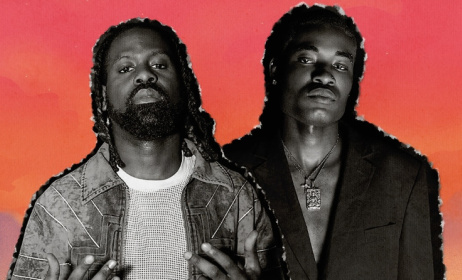Sharma Boy: Somalia’s voice of a new generation
Sharma Boy’s journey as a music artist is one of passion and determination. Having faced adversity, he is now on his way to achieving his dreams. Born in Burtinle in 1998 and raised in Somalia’s capital Mogadishu, Sharma Boy discovered his love for music at a young age and embarked on a path fraught with challenges – ranging from social stigma, limited resources and, worse, political instability.
 Sharma Boy.
Sharma Boy.
These challenges tested his resolve until the pivotal moment when he arrived in the US in June 2022. This transition marked a significant chapter in Sharma Boy’s musical journey, opening up new opportunities for him to pursue his passion unfettered, and enabling him to broaden his horizons and connect with a wider, culturally diverse audience.
Sharma Boy’s early influences can be traced to the cultural vibrancy of Somalia. Growing up in challenging circumstances, he found solace in the melodies of his homeland. Combining traditional Somali music with contemporary hip hop, Sharma Boy developed a distinctive and emotionally resonant musical style. At the core of his music lies a profound commitment to addressing social issues, particularly within the Somali diaspora. His lyrics serve as a vehicle for conveying messages of hope, resilience and unity. Through his music, Sharma Boy has become a potent advocate for positive change, amplifying voices and inspiring unity.
The impact of the Somali diaspora on Sharma Boy’s music and advocacy efforts cannot be overstated; his ability to resonate with Somali communities abroad and also those in the homeland has been instrumental in strengthening cultural bonds and nurturing a sense of belonging among displaced individuals. This has also allowed for a unique blend of traditional Somali culture and contemporary global influences, and has provided a powerful platform for self-expression, cultural preservation and discourse on social and political issues, ultimately contributing to the evolution of Somali identity in the modern world.
Sharma Boy’s decision to settle on hip hop as his genre of choice is a deliberate one. Despite enjoying a wide range of musical genres, he found a connection to hip hop as the canvas for his experiences. The genre’s social commentary and ability to express personal narratives aligned closely with his own life journey.
Beyond music, Sharma Boy’s influences stem from his everyday life, the struggles he’s encountered and the stories of resilience and hope he’s witnessed.
Sharma Boy primarily raps in Somali, which allows him to connect directly with his cultural roots. But since arriving in the US, he has started incorporating English into his songs. This fusion of languages reflects his evolving artistic journey and his desire to connect with a broader international audience while staying true to his roots.
While Sharma Boy may have started his career at home, his music serves as a bridge, introducing the world to the sounds and stories of East Africa.
“Pursuing a career in rap music in a conservative, Islamic country brought about social stigma and criticism,” he says. “Some individuals see my music as inappropriate or contrary to our cultural and religious values. Somalia has also faced political instability for a long time, making it difficult to plan events or even to ensure personal safety.”
Sharma Boy has also had to contend with envy and competition. “In Somalia, clanism is a prevalent issue, and this has resulted in peers from different clans being unsupportive or even hostile. Clan loyalties and prejudices could have real potential to hinder growth.”
The artist is currently working on various projects, including the creation of a new album and the production of a documentary about his life. He is also involved in collaborations with artists from different backgrounds in Minneapolis where he currently resides.
Sharma Boy’s manager, Jihan Mohamed, says his courage to rap about issues like the al-Shabaab terrorist group shows what he stands for as an artist.
“Sharma Boy’s music informs the global audience about the issues faced in Somalia,” Jihan says. “By addressing sensitive topics like conflict, he encourages discussions that can lead to a deeper understanding of the root causes and potential solutions to the problem. His music humanises the struggles of the people in Somalia, making it easier for listeners to connect with and empathise with their experiences. His music can be a source of action in support of peace initiatives in Somalia.”
The future of hip hop in Somalia is likely to depend on the balance between cultural preservation and adaptation. With artists like Sharma Boy as the genre’s new transmitters, the art form remains a powerful vehicle for self-expression, cultural exploration and advocacy.
Indeed, Sharma Boy’s influence, particularly on young people in the Somali diaspora, is of great significance. Thanks to Sharma Boy, they are acquainting themselves with the language of their motherland through his music.




























Comments
Log in or register to post comments